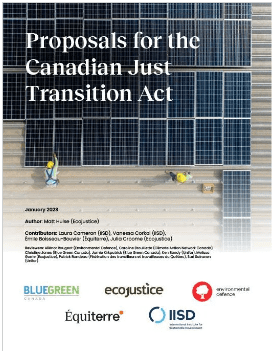Toronto, ON – A new report released today by Blue Green Canada – Canada’s foremost entity to bring unions and environmentalists together – shows that investments in renewable energy and energy efficiency would create more jobs than the same amount of investment in fossil fuels. The report comes as the federal government prepares the 2013 budget.
“It’s time to pull the plug on the $1.3 billion of taxpayers’ money handed to big polluters each year,” said Gillian McEachern of Environmental Defence. “Canadians can get more bang for our buck – more jobs, more wealth and better economic stability – by investing in industries that help prevent climate change rather than those that make it worse.”
The report describes the job creation potential of investing the $1.3 billion in federal subsidies, now given to the oil and gas sector, in renewable energy, energy efficiency and public transit. The results show that six to eight times more jobs could be created: 18,000-20,000 jobs in clean energy sectors vs. 2,300 jobs in oil and gas.
“The federal government needs to recognize the potential to create jobs while thinking long-term for the health of the environment," said Dave Coles, National President of the Communications, Energy and Paperworkers Union of Canada (CEP). "The oil sands provide our workers with jobs, but the current pace of expansion of that industry is not good for the stability of our communities or the environment. We need to get serious about the transition to clean energy, and that includes having a plan for putting people to work."
The report documents the growing global job market in renewable energy where approximately 5 million people were employed in the sector worldwide last year. Canada is at risk of being left behind as other more forward-thinking countries invest in renewable energy and reap the financial rewards.
The report also highlights the financial and social risks of increasingly tying Canada’s economy to oil. Volatile revenues for the oil sands mean instability for government revenue. Volatile pricing for oil is why expensive oil sands projects were hit the hardest during the recession, meanwhile investment in renewable energy continued to climb. Expanding oil exports also worsens the impacts of the petrodollar, which hurts manufacturing jobs in other parts of the country.
“It's not a matter of good jobs vs. bad jobs, or east vs. west, but creating a labour shortage in one part of a country and killing jobs in another is not a viable economic plan for Canada,” said Ken Neumann, Canadian National President of the United Steelworkers Union. “We need to get to work retooling our economy to harness the job potential of the growing clean energy sector and fight global warming so workers across the country have good jobs, and our kids have a safe planet.”
Blue Green Canada is an alliance between Canadian labour unions, environmental and civil society organizations to advocate for working people and the environment by promoting solutions to environmental issues that have positive employment and economic impacts. The alliance is based upon the realization that a future sustainable economy must provide good jobs and protect the environment, not one or the other.
-30-
For more information or to arrange an interview, please contact:


